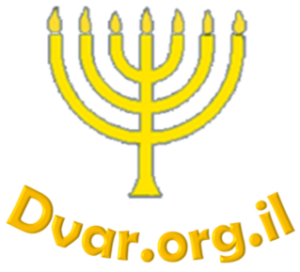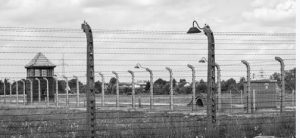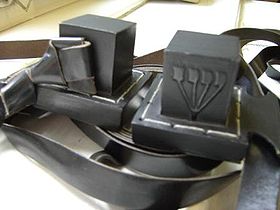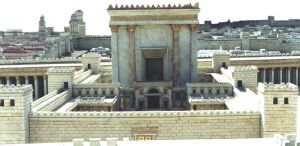 Parashat Ha’azinu
Parashat Ha’azinuParashat Ha’azinu
This week’s parsha is actually a song of prophecy. It depicts what will happen to the Jewish people until the end of days. There are ten such prophetic songs, or shirot:
1. Adam composed a song for Shabbat in the Garden of Eden.
2. At the Red Sea, Moses and the Jews sang a shira about the miraculous deliverance from Pharaoh’s army.
3. The Jews sung another shira at the Well of Miriam.
4. Moses taught the people the song of Ha’azinu (on the day of his death).
5. When the sun miraculously stopped for Joshua in Givon for the sake of the Jews, he sung a shira.
6. Devora and Barak composed a song when Hashem delivered the enemy into their hands, including the Canaanite general Sisera.
7. When Hannah gave birth to Samuel, after being childless for many years, she praised G-d with song.
8. At the end of his life, King David composed a song of thanks to G-d for having saved him from his enemies.
9. King Solomon wrote Shir Hashirim (Song of Songs).
10. The tenth and greatest song will be sung by the Jews when G-d redeems them from the present exile.
As Moses was about to start the shira, he commanded the heavens to be still. This caused a terrible commotion in the upper worlds – a human being dared to silence the universe? “Moshe, Moshe,” a voice was heard, “why do you cause such turmoil?” Moshe replied that he wanted to call Hashem’s Name and give honour to Him. At that point, heaven and earth were silenced, and remained silent until Moshe finished his prophetic song. Fortunate is the human being who has nature at his command!
Moshe declares that the Torah is like rain. There are many reasons for this:
· Both are vital for the survival of the universe.
· Both come from Heaven.
· Water is a cleanser, and the Torah purifies and elevates the soul of the one who studies it for the sake of Heaven.
· Rain develops a seed into a plant, and the Torah develops the seed in a person’s heart – providing the person dedicates his heart to Torah study.
· Fish live in water, yet thirst for every falling raindrop. Similarly, a Jew never tires of learning Torah, and strives to hear yet another Torah explanation.
Moses explains the absolute justice of G-d’s ways: “When I ascended Mount Sinai I was shown how G-d occupies Himself daily. His day is in four parts: In the first, He studies Torah, in the second, He sits in judgement, in the third, He pairs off matrimonial partners, and in the fourth, He decides on sources of sustenance for all His creatures.
Even though He is mighty, He never punishes out of anger, only because justice requires it. He ultimately rewards the righteous and punishes the wicked. After a person’s death, when he is judged for all his deeds, he will admit “You judged fairly.”
Rav Nechunia used to dig wells, so that the pilgrims who used visited the Temple on Yom Tov would have enough water. Once his daughter fell into a deep cistern. Messengers were sent to the great Rabbi, Chanina ben Dosa, to inform him of the misfortune. “She is still alive,” he announced. An hour later, Rabbi Chanina spoke again, “All is well with her!” After three hours (too long a time for her to survive underwater) he proclaimed, “She came up!” Sure enough, the girl had risen to the surface of the water. When asked who had brought her up, she replied, “A ram led by an old man (Abraham)”. They asked Rabbi Chanina “Are you a prophet that you predicted such events?” “I am neither a prophet nor a prophet’s son,” he replied, “but I thought that G-d wouldn’t let a tzaddik’s descendants suffer death in the very pit which he laboriously dug for the benefit of the Jewish people.” Nevertheless, Rabbi Nechunia’s son later died from thirst (despite his father’s merit in the matter) because G-d is exacting with His righteous ones, even to a hair’s breadth. He punishes them for the smallest offence in this world in order to reward them fully in the World to Come.
Were a human being to die without suffering, the Attribute of Justice would have the upper hand against him on the day of judgement. His sufferings in the present world atone for his sins.
Even though Rosh Hashana is commonly referred to as the Jewish New Year, it is actually the New Year for all mankind. Nonetheless, Am Yisrael is first to declare God’s kingdom on this day, for it is our national duty to proclaim His Name. As we begin the year by sounding the TRU’AH, we specifically use a shofar from an “ayil” (a ram) – the symbol of “akeidat Yitzchak”, a testimony of our total devotion to God. In doing so, we remind the Almighty of His choice of Avraham Avinu and His special relationship with his children, in order that He NOT judge us like any other nation; but rather as His own special Nation.
The repetitive nature of everything associated with Rosh Hashanah is noteworthy. During the entire month of Elul, we blow the shofar at the end of shacharis (morning prayer). Unlike Matzo, where many have a custom to abstain during the month of Nissan – 15 days before the festival of Passover – and others will not eat Matzo for a month in joyous anticipation of the spiritual crunch, anticipating Rosh Hashanah seems different. Instead of creating excitement by not blowing the shofar, we diminish the level by becoming accustomed to it. Of course, we must prepare ourselves. There is a lot at stake on Judgement Day, but wouldn’t an extemporaneous and unrehearsed blast of the shofar send more of a shiver down the spine and more forcefully a call for repentance, rather than a shofar-sounding ritual performed for 30 days prior that may by now feel quite rote?
The Selichos services are also a lead-up to the great day. Sefardic Jews have the custom to recite the pre-dawn prayers for the entire month of Elul. Moreover, Ashkenazic Jews can recite the selichos for more than a week before Rosh Hashanah. Would there not be a consideration that many Jews would get prayed-out from the pre-holiday supplications? Isn’t there a chance that they would get blown-away by the repetitive nature of the month-long shofar exercise? In the Selichos service, we beseech the Almighty as if we were destitute. “Like beggars and paupers we knock on Your door. On Your door, we knock, Merciful and Compassionate One” (from the first Selichos prayer L’cha Hashem hatzedaka). Again, we knock – not once, but twice! Isn’t once enough? Surely G-d is not in the kitchen. He can hear us the first time!
A meshulach (a man who raises funds for charity) came one sunny Sunday morning to a large home in the Five Towns of Long Island. Eagerly he rang the bell, and simultaneously knocked on the door. A woman, quite displeased, swung open the ornate portal to her home and, knowing the man’s intent, she began to shout. “What do you want? I never met you in my life! How do you expect me to give charity to someone I have never seen? I’m sorry, but this is my policy and I just can’t give you!” The meshulach was not perturbed. Slowly, he walked around the block and fifteen minutes later he was back at the same door. Again he rang the bell, and again the woman came out shouting. “I told you I never met you in my life! How do you expect me to give charity to someone I have never seen! Didn’t I clearly explain my policy to you?” The meshulach just smiled as he replied. “You are absolutely correct. However, you forgot one small thing. You know me already! After all, we met ten minutes ago!”
The weeks before Rosh Hashanah we must be wary that we may have to knock a few times to get into the big door. Of course, Hashem knows who and what we are, but we may be a little foreign to him. The daily shofar blasts, the recital of chapter 27 of Tehillim, L’Dovid Hashem Ori, twice daily in our prayers and the recital of daily selichos are all summarized in the words we recite, “like beggars we knock…we knock on Your door, Merciful One.” We realize that we must reacquaint ourselves with the commitments and the great resolutions that we accepted upon ourselves one year ago. But if we knock once and knock again, ultimately we, too, can smile at the One standing at the door and ask for all our desires. After all, we were just there. And He knows us already!
Customs prior to Rosh Hashanah
· It is customary the day before Rosh Hashanah to get up earlier than on other selichot days to recite the special selichot which are much longer than normal. This day is called ‘Zechor Brit’ (remembering the covenant).
· Many have the custom to fast on Erev Rosh Hashanah, for at least half a day.
· The shofar is not blown on this day. One of the reasons for this is to confuse the Yetser Harah (Mr Evil Inclination). He has a very short memory, and may be led to believe that the Day of Judgement has already passed.
· One should endeavour to spend the day in prayer, Torah study and performance of Mitzvot and good deeds. In particular, one should make sure that poor people have enough to buy Yom Tov necessities, especially food.
· One should approach family and friends and ask for forgiveness for any injustices done or aggravation caused.
· It is customary to visit the cemetery on Erev Rosh Hashanah. If there are people collecting charity there, one should be careful to give. If one is unable, one should set aside money and donate it as soon as possible after returning from the cemetery.
· It is customary to have a haircut and cut one’s nails short before Yom Tov. One should also wear freshly laundered garments in honour of Rosh Hashanah. The house should also be clean.
· Many men have the custom to immerse themselves in a mikva, and this is indeed praiseworthy.
· One should spend some time familiarising oneself with the prayers in the Rosh Hashanah machzor, as well as teaching our families the prayers. That way, we do not remain confused in synagogue (I spent much of my youth like that.) These days there are many machzorim in Hebrew and English, some even with transliteration and fine commentaries – so none of us (least of all myself) have an excuse.
· Some say that it is a good omen to buy a new knife for Rosh Hashanah
· One should make sue to buy a new fruit upon which the special blessing of Shehechiyanu can be recited, on the second night of Rosh Hashanah.
· One should be extra careful not to display anger of any sort during these special days.
· Try and make a resolution that one should try and keep during the coming year. Ideally (according to Rav Shach) one should make lots of small, limited resolutions. These are easier to keep, and the Yetser Hara finds it difficult to stop us performing smaller resolutions!
Customs for the day of Rosh Hashanah
· It is interesting to note that the zodiac sign for Tishrei (the seventh month) is a pair of scales. This alludes to the fact that during this month we are being judged. May we all merit our scales to be tipped in the balance of good favour!
· Since on the second night there is a doubt as to whether to say Shehechiyanu, it is preferable that the woman of the house should wear a new garment prior to lighting the candles.
· There are many additions to the Amida (silent prayer) on Rosh Hashanah, and they should be said with great reverence. One must especially be careful to complete the third blessing ‘Hamelech Hakadosh’ – failure to do this means one must return to the beginning! However, one who fails to say ‘Yaaleh Veyavo’ need not repeat the Amida (but don’t try it.)
· On this day, three books are open before G-d: one for the righteous, one for the wicked, and one for the beynonim (in-between people). On Rosh Hashanah we greet each other by expressing hope that G-d will inscribe us in the book of the righteous, and immediately seal us for a good life in this world, and an eternal life in the World to Come.
· It is a special mitzvah to invite guests on Rosh Hashanah, especially poor people, and those away from home. One should endeavour to beautify the meal and not to worry about expense.
· One dips challah into honey (or sugar) in order to symbolise that we should have a good year. Also, the numerical value of Devash (honey) is equal to ‘Av Harachamim’ (Father of Mercy). One should strongly avoid sour or bitter foods – who wants a bitter year!
· There is a special order of foods with special blessings and prayers, and these should be observed carefully as they are of special value. One should refer to one’s machzorim and ask one’s Rabbi for details of these wonderful customs.
· Although this day is a most solemn day (when humanity as a whole is judged for the coming year), we should realise that we must have faith in G-d to be merciful to us, and we should treat the day as a festival. We should feel confident that with the right actions, we should merit a good year.
· Indeed one should avoid idle talk any time of year, but it is most important on Rosh Hashanah to avoid levity. We need to show G-d that we treat this special day with respect.
· One should learn the tractates of Mishnayot of Rosh Hashanah, and this is a very praiseworthy mitzvah. Some have the custom to learn all four tractates after the meal.
· One must be very careful to perform the ritual of mayim acharonim (washing hands at the end of the meal) even if one does not have the custom to perform this mitzvah during the year.
· Be careful to include Yaaleh Veyavo in the benching!
· On the morning of Rosh Hashanah, one should rise before dawn, and try to pray with the Netz (sunrise), as befits this holy day. One spends a long time in shul, but one should leave unhurriedly and in a good mood.
· Don’t sleep in the afternoon! The Jerusalem Talmud states that one who does this, will have his ‘mazel’ (good luck) sleep during the coming year, G-d forbid. One may be more lenient on the second day, especially if one is exhausted, weak or infirm.
· On the first day one should say the Tashlich prayers (after the mincha prayer is the best time). G-d revealed His words to the Prophets near bodies of water. G-d’s Divine Presence is therefore present at water, which is a symbol of purity. For this reason we pray next to a stream or river (which must contain fish) so that we can throw away our sins – and hope that we never see them again, as they sail down the river. There are many reasons for the fish – they are covered from man’s sight, so that they are not subject to the ‘ayin hara’ (evil eye), which we hope will be the same for us. They also multiply in great numbers, again which we hope for us, both individually, and collectively as a nation.
A baker with a tray of cakes once stood in the street trying to sell his wares. A practical joker came up to him and asked: “How much do you want for the whole lot?” The baker replied that he wanted $10 for the whole tray. The joker replied that he would pay the $10 on condition that the baker himself eat the entire tray of cakes. “I’ll stand here to make sure that you keep your part of the agreement,” added the joker. When the baker had finished the last cake – you guessed it – the joker ran away without paying a penny. It was no use for the baker to scream and complain about it – he had eaten his own cakes, depleting his stocks without making sure that he would be paid for them. In effect, he had caused his own financial loss. Who is the joker? None other than the Yetzer hara. He tries to trick us by offering to buy our wares and to fulfill our desires. But at the end of the day, we are left holding the burden of the spiritual financial loss, as it is us who committed the crimes ourselves and destroyed our souls. Beware of this joker!
Gur Aryeh wishes all its faithful readers a happy, healthy and prosperous New Year. May we all be inscribed in the Book of Life, and may we merit to see the Final Redemption speedily in our days, Amen.
SHABBAT SHALOM





